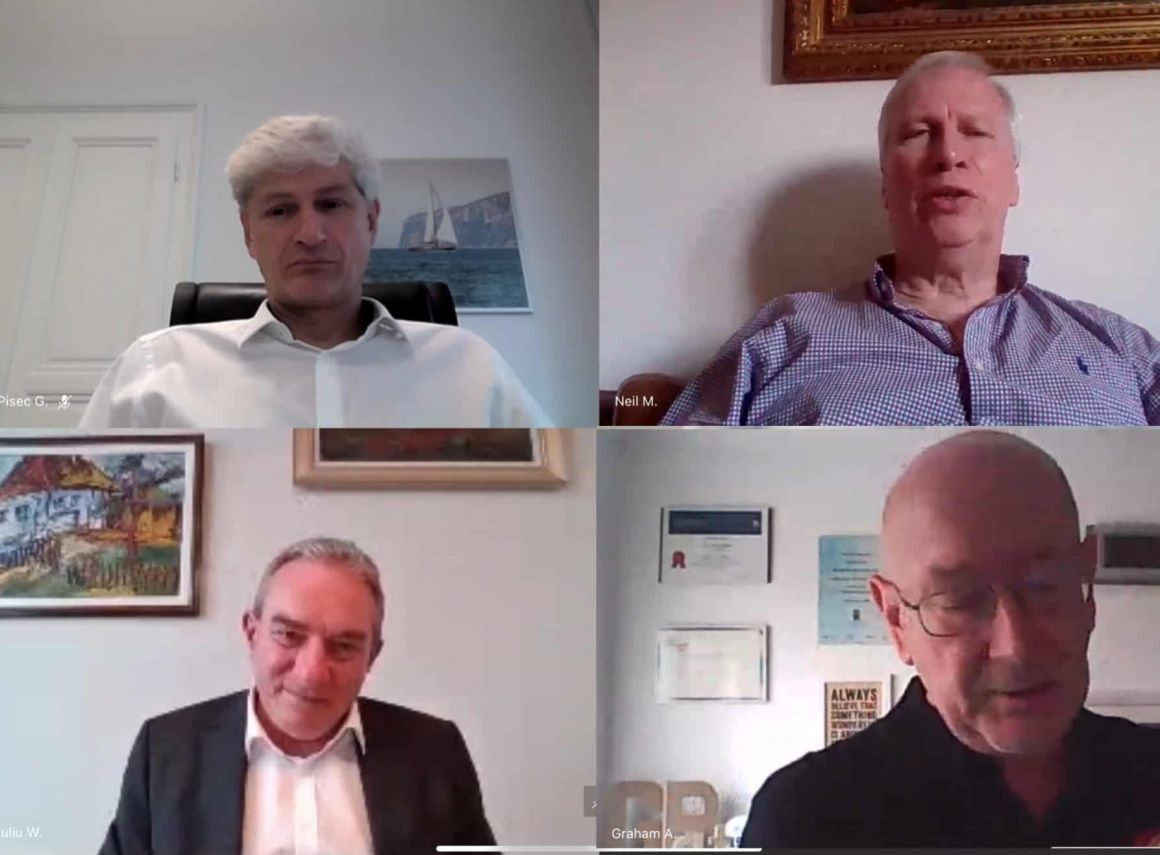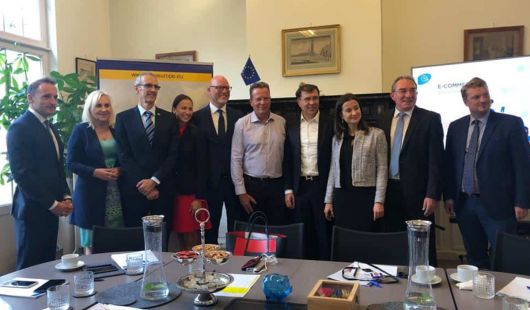The Impact of COVID-19 on International Trade
The COVID-19 Crisis mostly accelerated certain trends, as some of these were already present at earlier stages. Firstly, international actors were already more inward looking and economic nationalism has been on the rise in the last couple of years. Secondly, there has been a stronger role of government in the economy, as we have witnessed instances of managed trade in the case of the U.S.-China Phase One deal, or instances of managed economy across important global actors such as China or India. Lastly, trade disruptions were also already present, pointing to a clear need for strategic autonomy, with resilient and diversified supply chains, and a trade policy, which is concomitantly promoting sustainability, innovation and growth.
COVID-19 has thus been an important catalyst to rethink EU policy, in trade and many other areas. I will discuss today the efforts to review the EU trade policy, as COVID dynamics are only a part of a larger picture, which determined a timely reviewing exercise by DG Trade presented this week by Commissioner Phil Hogan. Surely, I will touch upon the impact of COVID as well, but first; let me start with the contemporary context.
It is pertinent to consider some main actors of the international trade scene, and for the purpose of today’s conversation, I will make observations on three key players, namely the EU, the U.S. and China, starting with the one, we know best.
We are all aware that the EU is a proponent of the rules-based multilateral trading system, yet this multilateral regulatory environment is currently under threat, given the volatilities of the international system and of the practices of important actors such as U.S., China, India or Brazil. We increasingly have to deal with unfair competition, which prompts us to improve our trade defence instruments, remaining open for business but with stronger rules and better enforcement on the EU single market; we need a level playing field. The EU remains a staunch supporter of the global institutions, but multilateral institutions such as the WTO are in dire need of reforms, and the EU needs to spearhead the effort to modernize and make them fit for the 21st century.
Our two main global trade partners, the US and China, are also heavily influencing contemporary trade dynamics. The U.S. is taking up forms of managed trade and economic nationalism, becoming isolationist and leaving a leadership vacuum on the trade arena. One can mention here dynamics that led to significant trade tensions and Washington’s assertive unilateral practices, which included aggressive tariffs, prompting a trade war with both the EU and China. This was further aggravated by Washington’s tendency to boycott multilateral institutions such as the WTO. Concomitantly, China is expanding its global influence, pushing forward flagship initiatives such as the Belt and Road Initiative and the China Manufacturing 2025 strategy. Both of these can entail the uptake of market distorting practices such as state subsidies, discriminatory practices against European businesses investing in China, underbidding in public procurement by Chinese State-Owned Enterprises (SOEs) and illicit practices such as forced technology transfers.
Also linked to the context, we have to mention the new Multiannual Financial Framework for 2021-2027 and the Economic Recovery Instrument built on the MFF, as these have an important role to play in this moment of rethinking for the future of the European project. The funds encompassing some 1.85 trillion Euros have two main priorities. Firstly, they will facilitate the Digital transition of the Union, as digitalization is changing the way we live, work, and implicitly trade, with important challenge for regulators. Secondly, the important aspect of sustainability is something that is at the heart of the European Green Deal, with an impact in trade as well, as it triggers the need for stronger sustainability chapters in Free Trade Agreements.
The COVID pandemic has taught us that high dependencies in trade are detrimental for the reliability and sustainability of our supply chains, particularly in crisis management. We have been reminded that global supply chains, by their nature, know no borders and that we are all interconnected and mutually dependent. Hence, we need more resilient and diversified supply chains. This does not mean self-sufficiency, as we rely on imports and raw materials from international partners. Nonetheless, we need to diversify, wherever possible bring back some industry to the EU, and promote better information campaigns about the importance of trade in the economy. It is also clear that economic activity will fluctuate depending on the evolution of the crisis and supply & demand asymmetries will emerge as states gradually reopen or restrict economic activity. We thus need to ensure principles of fair competition, and defend the Single Market against unfair trade practices. We need to protect without being protectionist.
On this backdrop, I am happy to see the Trade Commissioner’s efforts to review the EU Trade Policy and apply a lessons learned approach from the past 5 years since the launching of the Trade for All Strategy back in 2015, including lessons from the current public health crisis. As a Member of the European Parliament, I am glad to see that the public consultation is open for all relevant stakeholders. I encourage everyone to participate until the September deadline, in order to end up with a legitimate EU trade policy that best balances the interests of the large industries with those of SMEs, that brings benefits for both larger and smaller Member States.
The concept of Open Strategic Autonomy, as promoted by Commissioner Hogan is also an important element here. The EU needs to lead, and shape globalization in the favour of our citizens, entrepreneurs, SMEs, as well as consolidating ties with likeminded partners. As the EU market is one of the most open ones, we need to remain pragmatic, and ensure that fair competition is the guiding principle both at home and abroad. With the COVID crisis, we have seen attempts of abusing this openness by businesses in the pharmaceuticals sector, for instance. Thus, we need a robust set of Trade Defence Instruments (TDIs), and I am happy to see that the commission is also working on an instrument on state subsidies; we will carefully analyse the Commission White Paper on Foreign Subsidies in INTA.
In order to diversify, the EU should expand on the existing 76 trade agreements, building on relations with like-minded partners such as Australia and New Zealand, and certainly pushing through for an equitable agreement with the United Kingdom post Brexit, to name a few. Efforts to ensure a level playing field are of utmost pertinence here. What is equally important, besides expanding our FTA network, is also to work on proper implementation of the existing agreements.
Linked to this, I am very curious what the EU Chief Trade Enforcement Officer will actually do, as at this point it seems that the responsibilities are manifold. This office will review the implementation of Trade Agreements, will oversee Trade and Sustainable Development (TSD) chapter enforcement, and will monitor fair competition conditions and market distortions in order to be able to decide where TDIs are to be deployed. I assure you that the INTA committee will complement this role in the monitoring of the implementation of FTAs. To give you an example, in the case of the EU-Vietnam FTA, there has been an agreement with the Vietnamese side to set up a joint committee for scrutinizing implementation, between the INTA Committee and the relevant committees in the Vietnamese National Assembly.
A key aspect of EU Trade Policy is that it ought to have a balanced set of benefits for all relevant stakeholders, particularly SMEs, given their vulnerabilities, as showcased by the public health crisis, and their importance for European economic growth and innovation or Research and Development (R&D). I would like to mention here our work in SME Europe, the EPP’s SME organization. From March until mid-April, at the peak of the COVID pandemic, we undertook an SME Survey, with more than 900 SMEs participating from all corners of the EU. I would highlight here 5 conclusions.
Firstly, SMEs showcased a dire need for access to finance, particularly in the aftermath of the COVID crisis. This can be done through government grants and simplified access to credit by financial institutions. Secondly, tax cuts (or tax deferrals) are a crucial contribution to boosting the self-healing powers of the economy, and help SMEs bounce back after the crisis. Thirdly, bureaucracy needs to be simplified for SMEs and red tape reduced. Thus all useful administrative reforms should be completed as fast as possible on both the EU and Member State levels. This entails flexibility on the European labour market, improved recognition of qualifications, efforts to digitalize administrative tasks and a ‘One in Two out’ principle for acts regulating the internal market. Fourthly, education remains key for entrepreneurs and start-ups; we need to familiarize our youth as early as possible with digitalised solutions, smart skills and transferable know-how for them to be able to survive in a rapidly developing and dynamic labour market. Last but certainly not least, we need to communicate better the means through which our SMEs can tap into the benefits of Trade Agreements, and here DG Trade has been doing a good job so far, though much still remains to be done. We need online tools for SMEs on Rules of Origin, a multilingual communication for specific EU regions, a consolidation and improvement of SME-dedicated chapters in trade instruments and agreements, to name but a few examples.
Before finishing, I would like to mention that I have also looked through the EuroCommerce 2019 paper on trade priorities, and I agree with its guiding principles; free trade and open markets, promoting sustainable trade, ensuring level playing field with third countries and reducing bureaucracy are all pertinent concepts, maybe now more than ever. I am certain these principles are at the heart of the efforts to reform EU Trade Policy, and in the INTA Committee, together with my colleague MEPs we are striving to have an EU Common Commercial Policy that works in the benefits of European businesses and citizens, to promote leadership in sustainability globally, while remaining free, fair and open.
Remarks delivered by MEP Iuliu Winkler (EPP/RMDSZ), INTA Vice-Chair, at an EuroCommerce Webinar discussing the Imapct of the SARS-CoV-2 crisis on EU Trade Policy – 18 June 2020



